We all know that you can easily pay a not so small fortune for a horse these days with some horses literally selling for millions but thankfully this is more of an extreme than the norm. While horses are by no means cheap there are some breeds that are cheaper (or at least less expensive) than you might think.
Which horse breeds are the cheapest? The Mustang is by far the cheapest horse breed out there but popular breeds such as the Quarter Horse, Appaloosa, and even the Thoroughbred can often be bought for less than $1000.
Mustang
Height: Most horses stand between 14hh and 15hh (56 inches and 60 inches), but they can range from 12hh to 16hh (48 inches to 64 inches).
Color: Any color or coat pattern can be found.
Character: Mustangs are feral horses but they have the character of wild horses, they’re brave, courageous, and have an abundance of stamina. They’re also highly intelligent horses that make excellent mounts.
Country of Origin: USA
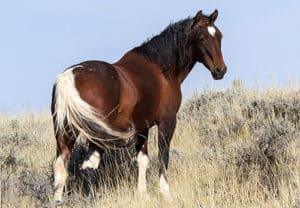
Mustangs are often overlooked when people think about buying a horse but they can make surprising good family horses if given the chance, yes they are feral horses but that doesn’t mean they’re untrainable. While their ‘wild’ nature will put many people off it’s one of the characteristics that makes them such versatile horses that can happily live in the bleakest of environments.
The Bureau of Land Management (BLM) runs an annual adoption scheme where they offer a number of horses for sale. The starting price for these horses is £25 for an untrained horse or $125 for a trained horse. While you shouldn’t consider training a Mustang yourself if you don’t have any experience they can, once trained, literally turn their hoof to anything and will do well in most disciplines.
Quarter Horse
Height: Generally anything between 14hh and 16hh (56 inches and 64 inches) although some horses can reach 17hh (68 inches).
Color: Most colors except spotted and pinto can be found but sorrel is the most common.
Character: Quarter Horses are extremely intelligent horses that are easy to train, their calm, gentle natures make them ideal family horses.
Country of Origin: USA
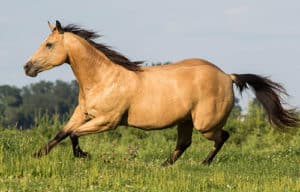
The Quarter Horse is one of the most popular breeds in America (if not the world) but that doesn’t mean to say they have a hefty price tag to match. In fact, their popularity has meant that the market is flooded with Quarter Horses so the price is comparatively low with good quality horses selling for around $1000.
They have gentle, docile natures but don’t let that fool you though, the Quarter Horse is often said to be able to unwind like lightning, being able to go from a standstill to a full gallop in the blink of an eye. In fact, the Quarter Horse is the fastest breed over a quarter of a mile distance, which is where they get their name from.
Thoroughbred
Height: The average is 16hh (60 inches) but can stand anywhere from 15.2hh to 17hh (61 inches to 68 inches).
Color: Any solid color.
Character: Being hot-blooded horses they have a spirited personality that won’t suit everybody but despite that Thoroughbreds can be extremely affectionate horses.
Country of Origin: United Kingdom
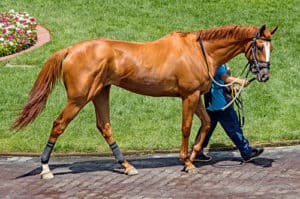
The racehorse industry is a multi-billion dollar business with thousands of horses being bred each and every year in the hopes of becoming the next Secretariat. Most of these horses won’t succeed and will never even make it out of the starting gates, despite having all of the training. These horses are referred to as OTTB (Off The Track Thoroughbred), a term that also includes horses that have, for whatever reason, retired. While a racehorse could cost millions, OTTB horses are regularly sold for between $1000 and $3000 with many of them being registered with the Jockey Club.
While many people think Thoroughbred is only good for racing they’re actually perfectly built for many sport horse disciplines such as jumping, dressage, and even eventing. They also make unusual Western horses.
Appaloosa
Height: Typically horses range from 14hh to 16hh (56 inches to 64 inches).
Color: Spotted.
Character: Appaloosas are said to be one of the most loyal and affectionate of all breeds, they’re highly intelligent animals that make versatile family horses.
Country of Origin: USA
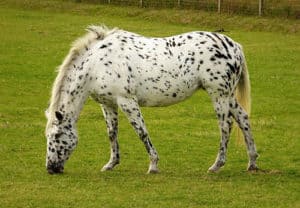
Like the Quarter Horse, the Appaloosa is a very popular breed that can be bought for a lot less than you might think. Of course, you can easily pay tens of thousands for a good quality foundation Appaloosa with a prestigious lineage but you can also easily buy a great Appaloosa for less than $1000.
If you like to stand out from the crowd and like a splash of color then the Appaloosa is perfect for you. Having originally been bred by the Nez Percé Indians, the breed takes its name from the Palouse River in modern-day Washington where it was said to have been created.
Today Appaloosas a loved for their stamina, speed, versatility as well as their kind natures and can-do attitudes.
Arabian
Height: Generally Arabians stand between 14.1hh and 15.1hh (57 inches and 61 inches).
Color: Bay, gray, and chestnut are the most common but black and roan are also allowed.
Character: The Arabian is wrongly said to be highly strung, but instead they’re intelligent animals that can easily be handled by children of all ages. They’re extremely loyal and have very affectionate natures.
Country of Origin: Arabian Peninsula
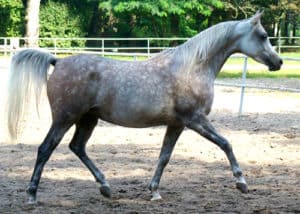
The elegance and gracefulness of the Arabian means that it’s often associated with royalty and extreme wealth but it doesn’t always have the price tag to match and can easily be bought for around $1000. The main reason for this is that the Arabian is primarily bred for endurance which isn’t considered a money sport so the cost of the horses is generally lower.
Arabians are often, wrongly, thought of as being temperamental horses that are difficult to work with which can also have an effect on their value. This impression though couldn’t be further from the truth as Arabians are extremely gentle horses. In fact, the breed is so gentle that the United States Equestrian Federation will allow children to show stallions in the show ring on their own.
Gypsy Vanner
Height: The average height is 14.2hh (58 inches) but horses can range from 12.2hh to 16hh (50 inches to 64 inches).
Color: Mainly piebald or skewbald but any solid color is also allowed.
Character: As a general rule Gypsy Vanners are gentle horses that have calm natures and can be handled by children. Having been bred to pull caravans (knowns as vardos), they’re often unflappable.
Country of Origin: Ireland
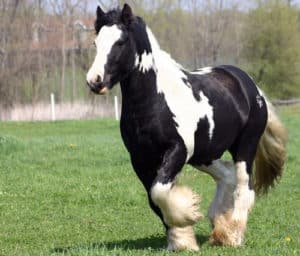
The Gypsy Vanner may only have been officially recognized as a breed in the mid-1990s but it has a history that goes back over 200 years to the 1800s when it was first bred to pull traveler’s caravans. When creating the breed, toughness, strength, and hardiness were important but the color wasn’t at all. The breed gets its distinctive marking from the fact that, at the time of its creation, colored horses weren’t in fashion so were much cheaper than solid colored horses. This fact alone earns it a spot on this list if you ask me, although that said they’re still pretty cheap today and can regularly sell for around $5000.
Right from the get-go, the Gypsy Vanner has been a kind horse that can easily be handled by very young children while their strength means that they can happily carry a full-sized adult. A lot of Gypsy Vanners also sport a rather fetching ‘mustache‘ in the winter.
Grade Horse (or Pony)
Height: Any height.
Color: Any color.
Character: Being of unknown breeding a Grade Horse’s temperament can be extremely varied.
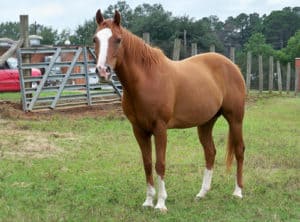
Okay I’ll admit that technically a Grade Horse or Pony by definition isn’t a breed but that doesn’t mean it shouldn’t be on this list, it simply means that its parentage or breeding is unknown or its paperwork has been lost. This simply means that they can be bought for way less than a registered horse can.
Back in the mid-1950s a Grade Horse, by the name of Snowman, was bought for an incredible $80 (less than $1000 in today’s money). With an unknown history, nothing much was expected from the horse but it wasn’t long until he started to jump clear round after clear round in the show ring. His success understandably began to turn heads and in 1992 he was entered into the Show Jumping Hall of Fame.
Crossbred
Height: Any height.
Color: Any color.
Character: The personality of a crossbred horse will invariably be a mixture of that of both of its parents.
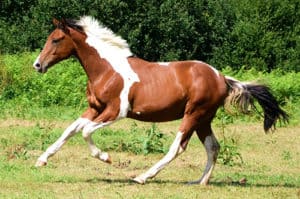
Again I know that a crossbred horse isn’t a single breed but many registries have an appendix or part-bred registry that allows a horse to have one parent registered in the main registry while the other parent is listed in the registry for another breed. Some breed associations will limit which breed the other horse can be while others are open to all. Some breed combinations have become so popular that they even have their own registry, for example, the Morab (Morgan and Arabian) or the Walkaloosa (Tennessee Walking Horse and Appaloosa)
These crossbred horses can often be bought for less than $3000 depending on the lineage of the registered parent which can make them a very attractive option if you want to know a horse’s pedigree but aren’t worried about having a particular breed.
The world competitive question world is a testament to how good these crossbreds can be with horses such as Milton (the first horse outside of the racing world to win over a million dollars in prize money) leading the way.
Where’s the best place to buy a cheap horse?
If you’re looking to buy a horse you’re spoilt for choice when it comes to where to look these days, from online to word of mouth.
Online
If you’re after choice then you’ll find plenty of that online with websites such as Equine.com, Equine Now, Dream Horse and even social media sites such as Facebook. While Facebook won’t allow individuals to sell animals they do allow businesses to do so and many barns will advertise horses they have for sale there.
The great thing about buying a horse online is that a lot of adverts have lots of pictures of the horse with some even having videos. Some websites also offer a safe way of contacting the seller without sharing any of your details.
TIP: When buying a horse online it’s a good idea to look for horses that are within traveling distance. This way you can still visit the horse before committing to purchasing.
Craigslist
Okay, so I know that Craigslist is an online site and should be included above but I wanted to mention it separately because it’s often overlooked when purchasing a horse. Their rules say that the sale of animals (including horses) is prohibited but they do allow for animals to be ‘re-homed’ for a small fee. This technicality in their rules means that you can effectively buy a horse at a very cheap price.
TIP: You should treat buying a horse on Craigslist just the same as you would buying it on any other website, do your research, ask the seller questions and visit the horses.
Magazines
While most of our lives have moved online and magazines aren’t as popular and widespread as they used to be they can still be a great place to look for horses. Many publications have a classified section full of horses that are for sale.
TIP: If you’re into a particular discipline or are looking for a specific breed then you may find magazines specializing in that are more helpful.
Auction
A lot of people have reservations about auctions but if you know what to look out for when buying a horse, an auction can be a great way to buy one at a reasonable price. Horses get sold at auction for many reasons so it’s definitely worth investigating if you don’t want to pay too much for a horse.
There are a range of different types of auctions and some are obviously better than others but as a general rule the bigger the auction the higher the prices will be. That said though you will often be fully protected if something does go wrong though.
TIP: If you’ve never been to an auction before then this article will help to explain how it all works as well as what to look out for.

Meat sales
I know you’re probably a bit shocked by me suggesting you can buy a cheap horse from the meat sales market but if you know what you’re looking for you can get a good horse for an incredible price. These horses have often been bought at auction without papers so their history isn’t known but that doesn’t mean they’re no good.
I had a friend who would always buy her horses this way, she very rarely paid more than $400 for a horse and did occasionally buy a horse she wished she hadn’t but most were great.
TIP: If you do decide to buy a horse at a meat market then look for ones with a halter, this means that they’ve been handled. Horses without a halter have never been handled.
Rescue center
A rescue center may not be the first thing that springs to mind when you think about where to buy a horse from but while many centers won’t technically sell their horses they do offer some for adoption, I don’t mean the sort of adoption where you give them a few bucks every year in return for a letter and a couple of photos.
I mean a true adoption in the sense that you look after the horse on your own land (or boarding yard) and are solely responsible for the horse, but if you’re not able to look after the horse anymore, for whatever reason, the center will take it back. This way you know that the horse will always have a safe home no matter what happens.
TIP: Rescue horses are often shy, nervous, and frightened horses that need a lot of patience and understanding. In time they’ll grow into affectionate horses but if you don’t have the time or patience to bring the best out of the horse don’t even consider a rescue horse, they’ve already been through enough.
Ask around
Word of mouth is still one of the best ways of buying a horse, especially in the local area, so ask people if they know of any horses for sale. Your instructor is always a great place to start but, tack shops, feed merchants, vets, and farriers are also worth asking too.
TIP: If your ideal horse is your favorite mount at the riding school then why not ask the school if they’d consider selling the horse to you. They might not but most riding schools will sell their horses from time to time so it’s letting them know you’d be interested.
Can you get a horse for free?

While it may be extremely rare to be able to get a horse for free it’s certainly not impossible but the question you should always ask yourself though is why is the horse being given away. It may simply be that the most important thing for the owner is to know the horse is going to a good home, but it may also be that the horse has some issues.
Whatever the reason the horse, to some extent, still isn’t technically free because you’ve still got to keep, feed, exercise, and generally look after the horse and any owner will tell you they cost a lot of money and take up a lot of your time.
What should you look out for when buying a cheap horse
While we all like a bargain and don’t want to pay more than we need to for something it’s not the best way to approach buying a horse. I’m not saying you should pay way more than you think a horse is worth but just that you should never buy a horse solely on the cost.
I’m sure we’ve all heard the saying ‘there’s no such thing as a free lunch’ so if you really are looking to buy a horse as cheaply as possible there are a few things that you should be aware of first. Breed, age, training, temperament, and even a horse’s medical history can all play a pivotal role in how much a horse is worth.
Breed
As with any animal, there will always be some breeds that are more popular than others but what might surprise you though is that in most cases a breed’s popularity can actually reduce the cost of a particular horse. The reason for this is because there are so many horses for sale that the prices are kept comparatively low.
Age
We might consider mature or middle-aged to be bad things but when it comes to horses they’re anything but and are regularly used to describe horses that are between 5 and 13 (mature) or 13 and 20 (middle-aged) which is considered to be, by many, the perfect age range for most people.
Horses that are around this age are the most popular so are more expensive but, certainly, in the case of 5 or 6 year old horses, you’re also paying for the time and knowledge of the trainer too. If you’re experienced in training horses then a younger horse will be ideal for you but if you’re not I’d stay clear of an untrained horse.
Older horses on the other hand are often a lot cheaper because, if they’re not there already, they’re heading towards retirement meaning they can’t be ridden that often. If you’re looking to buy a cheap horse as a companion for another horse though then an older horse could be a perfect choice.
Training

As I mentioned above you’re often paying more for a horse that’s been trained, in part because of the time and experience of the person who trained the horse. Training a horse takes time, patience, and a lot of understanding of horse behavior which is why a trained horse will often fetch a higher price.
If you’re an experienced trainer or are able to work with one then buying an untrained horse can often be a very good option but it’s important you know what you’re getting into.
Temperament
Everybody wants a bombproof horse that is a pleasure to ride, groom, load, and catch, and also loves children and pets but horses like this aren’t cheap. I’m not saying that all cheap horses are grumpy animals that will bolt at the first sight of their own shadow but if the price is important to you then you may have to compromise on some of the personality traits.
Part of the fun of owning a horse is that together you can improve your horse’s confidence so they become more bombproof. Also, as the relationship develops you’ll both grow closer so your horse will naturally want to spend more time with you and will trust you more so things like loading will become much easier anyway.
Medical history
Buying a cheap horse with a medical condition that requires either management or treatment is a false economy. Yes, you’ll have paid a rock bottom price for the horse but it won’t be long until the veterinary bills start to mount up.
Some unscrupulous sellers may try and hide any long-term medical conditions so if the seller won’t agree to a pre-purchase veterinarian check or allow you to speak to their veterinarian walk away.
Further reading
- The real cost of ownerhsip in the UK
- How much horses really cost in Canada
- Best breeds for beginners
- The world’s most unusual breeds
- Perfect horses for trail riding
- The 15 best gaited horses
- Drafts horses you can actually ride
- The friendliest breeds in the world
- Spotted breeds to get you noticed
- The best pony breeds for kids
- The most expensive breeds ever
- The best horses for running the barrels
I hope you found this article helpful. If you did I’d be grateful if you could share it please as it would really help me.
Recommended products
Over the years I have tried hundreds of different horsey products, from various blankets and halters to different treats. Some I’ve loved, others I’ve hated but I thought I’d share with you my top all-time favorite products, the ones I never leave the yard without. I’ve included links to the products (which are in no particular order) that I really think are great.
- Horse Knots by Reference Ready – If you’re like me and enjoy pocket reference guides then you’ll love this knot tying guide. These handy cards can easily fit in your pocket or attach to the saddle for quick reference. They’re waterproof, durable and are color coded to make them easy to follow.
- Mane ’n Tail Detangler – Even if you never show your horse you’ll need to detangle his tail from time to time (and possibly his mane too) which is always a challenging chore! I’ve found that if I run a little bit of detangler through my horse’s tails every few days it stops them from getting matted up and makes combing them easy, even if they’re coated in mud. I don’t know if I should admit to this or not but it also works wonders on my hair.
- TAKEKIT Pro clippers – Over the years I’ve tried a lot of different clippers and while some were obviously better than others I found these to be by far the best. They are heavier than a lot of other clippers but for me, that’s a good thing, it makes them feel more sturdy and hardwearing. On top of that they have a range of speeds so are just as good for clipping your horse’s back as they are his face. I also like the fact that they come in a handy carry case but that’s not for everybody. The company that makes them is super good and incredibly helpful too, a real bonus these days. The only thing I wasn’t keen on was the fact that it doesn’t come with any oil, but that’s not a major problem as it’s not difficult to buy lubricant.
- Shire’s ball feeder – There are so many boredom buster toys out there but I like to use these every day, regardless of whether or not my horses are bored. I find that it helps to encourage my horses to problem solve by rewarding them with treats (or pieces of fruit) but it also mimics their natural grazing behavior which helps to keep them calm and de-stressed.
- Horse safe mirror – This is a strange one that many people are surprised about but I like to put horse safe mirrors in the trailers as well as in the quarantine stalls. It helps to prevent the feeling of isolation by giving the impression of other horses being around. Being herd animals horses can get extremely stressed when they feel that they’re on their own but with these stick-on mirrors, they believe that at least one other horse is with them.
- Rectal thermometer – I know this isn’t glamourous at all but it’s vital for your horse’s well-being to be able to check their temperature and a rectal thermometer is the easiest way of doing this which is why I’ve added it to the list.
Shopping lists
I’ve also put together a few shopping lists of essential items that I’ve found helpful over the years. I’ve broken the lists down into different categories rather than put everything in one massive list 😉
